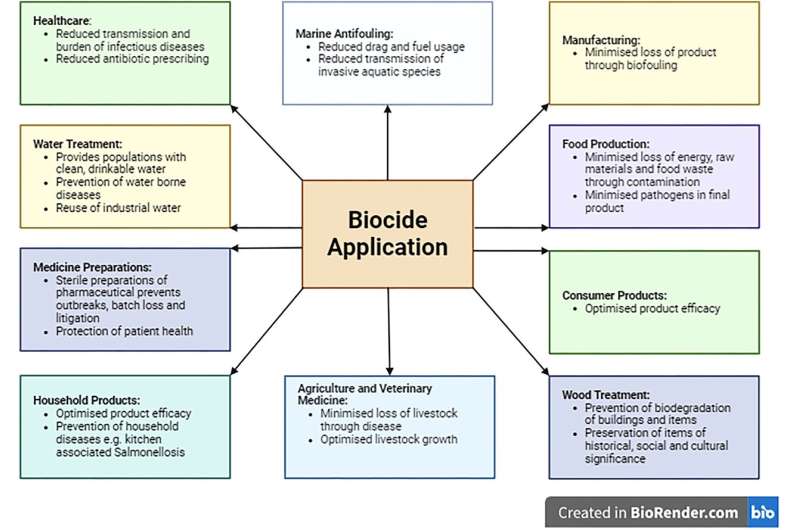This article has been reviewed according to Science X's editorial process and policies. Editors have highlighted the following attributes while ensuring the content's credibility:
fact-checked
proofread
Biocides are a useful tool to combat antibiotic resistance but appropriate use is vital, scientists suggest

A recent review in the journal Sustainable Microbiology discusses how the use of biocides can promote well-being—but must only be used when there are clear benefits.
Biocide use should be restricted to applications where there are tangible benefits but also not unnecessarily restricted where genuine benefits can be demonstrated, the new review suggests.
Contribution to sustainability
"We aimed to present an objective assessment of the potential contribution of microbiocides—widely used non-antibiotic antimicrobials—to sustainability," explained corresponding author Professor Andrew McBain.
"Having been involved in biocide research since 1999, I am aware of the need for a better understanding of the potential benefits of appropriate biocide use, as well as the generation of data on which to base improved risk assessment."
Biocidal (microbicidal) products play a critical role in controlling microorganisms in health care, industrial, community and home environments but there is concern that their use and misuse might contribute to the evolution of antimicrobial resistance (AMR).
Microbial control
Benefits of biocides include the control and prevention of infections in clinical settings with associated reductions in antibiotic use, preservation of a range of products and materials, substantial reduction in infection risk for consumers, hygiene in the community, such as in public swimming baths, and microbial control in many facets of industry.
"Antibiotic resistance is widely understood to be one of humankind's largest challenges. Biocides are one of a limited number of tools we have to reduce the need for antibiotic use, which most people would agree is a major driver of AMR," Professor McBain said.
"Yet at the same time, there is concern that biocides, particularly when used inappropriately, could contribute to AMR. This potential contribution, however, remains poorly understood. Risk assessments are often based on data that we believe do not always best represent the way biocides are used in the real world and should fully consider benefits as well as risks."
Critical assessment
The review provides a critical assessment of the contribution of biocides to sustainability based on a critical evaluation of the literature, followed by offering views on the future management of biocide use across the globe.
"I would not claim that the work represents a paradigm shift in thinking on the topic, but I do believe that there should be more balanced consideration of risks and benefits in the context of biocides, as well as a push for more realistic data on which to estimate risk," Professor McBain said.
"More work is needed to develop a reliable basis for appropriate biocide use. This will encompass research in microbiology and biophysics (where we have been developing collaborations), chemistry, formulation, regulation, and education."
Joined-up approach
"A joined-up approach with industry stakeholders is required to ensure that effective products are available when needed and that their use is appropriately regulated but not unnecessarily restricted," Professor McBain added.
While the review was a team effort, Thomas Willmott drove the writing, and it also formed part of the Ph.D. project of Layali Jadaan. It was supported by microbiologist Gavin Humphreys, and biophysics collaborator Jian Lu.
"Importantly, I contacted a US-based microbiologist and biocide specialist, John Chapman who helped considerably. John became a friend and mentor after we were introduced in the early 2000s by my late colleague Peter Gilbert," Professor McBain said.
More information: Thomas Willmott et al, Sustainable application of biocides to promote hygiene and minimize antimicrobial resistance, Sustainable Microbiology (2024). DOI: 10.1093/sumbio/qvae015
Provided by Applied Microbiology International





















